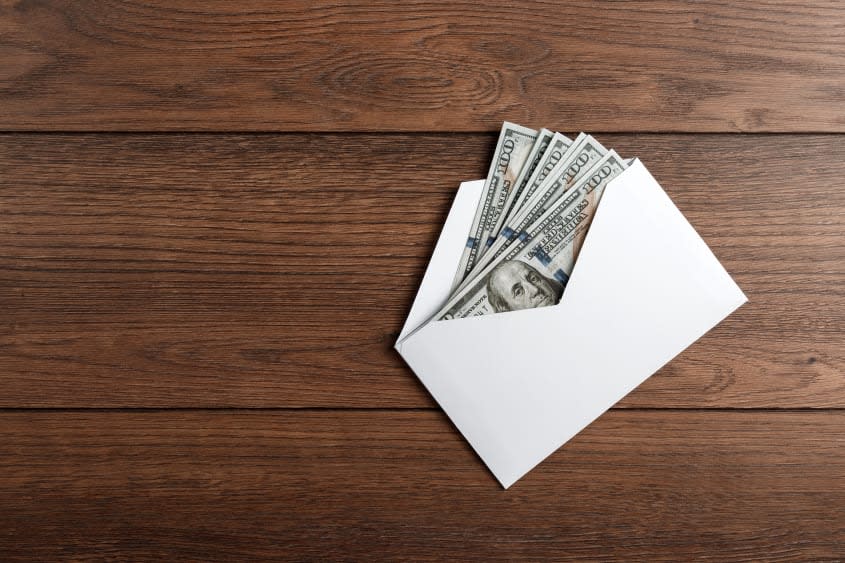6 smart ways new graduates can use cash gifts

If you recently graduated — whether from college, high school, or a master's program — there's a good chance you received a monetary gift in celebration of your accomplishments and in anticipation of your future. It might feel tempting to treat yourself after all that hard work. Or, you might just deposit the funds in your checking account.
But this windfall you just received, even if it's not huge, can actually be a great way to kickstart your financial future. It's worth thinking carefully about the best way you can use any cash gifts from graduation.
Start your emergency fund
As you leave school and prepare to enter the real world, it's helpful to start building a cushion you can fall back on if things don't go according to plan (and, spoiler alert, they won't). Stash your cash gifts "in a high-yield savings account that you don't use unless an unexpected expense comes up," Kiplinger suggested. This money set aside can help you navigate everything from your car breaking down to an expensive trip to the dentist or an unanticipated job loss.
Sure, you could put those costs on a credit card, but that solution "can be expensive in the long run if your card has a high interest rate," Discover pointed out. Discover added that you should try to build up an emergency fund with at least $1,000 in it that you can fall back on, interest-free.
Pay down debt
Another smart way to use your graduation windfall is for paying down debt. Maybe you took out student loans to cover the cost of your education, or perhaps you went a little wild with credit card spending during senior year. If you have multiple types of debt, consider tackling your debt with the highest interest rate first to reap the most savings.
While technically you can pay the minimum amount due, getting ahead on your debt payments can lead to savings down the road. For example, when it comes to student loans, "the more you can knock down your loans, the less interest you'll owe — and the less you'll pay overall," SoFi explained. That same principle applies to other types of debt as well.
Begin building your investment portfolio
You might also consider putting some of that money you got from graduation into investments. Mutual funds are "one easy way to get started" with investing, since they're "managed by professional investors who spread your money over a mix of securities, such as stocks and bonds," SoFi said. They do usually charge fees though, and like any investment, there is risk involved.
If you want to take your investing in a slightly different direction, you might get a jumpstart on preparing for retirement. Consider opening an individual retirement account (IRA) or, if you have an employer that offers one, a 401(k) plan. Not only will you enjoy tax benefits, but "your future self will thank you," Kiplinger added.
Invest in yourself
You could use your graduation cash to cover the cost of additional coursework, trainings, or certifications that could help advance your career or boost your earning potential. Or you could hire a career coach to help you navigate the early phases of your professional life. Or put it toward paying for appropriate interview clothes or getting your resume printed professionally.
Hesitant about spending on yourself? Remember that "cash is the number one tool that, if used appropriately and invested in your human capital (i.e. your ability to earn), will reap more than any mutual fund or exchange-traded fund (ETF)," Dennis McNamara, co-founder of wHealth Advisors, told Kiplinger.
Fund a move
It's common after graduation to relocate, either because you want a change of scenery, the job market in another area is stronger, or you landed a position somewhere new. But moving isn't cheap. You "can use your graduation money gifts for renting a moving truck or hiring professional movers, paying your security or utility deposits at your new place, or buying furniture and other household items that you need," Discover suggested.
Save for your future home
Maybe you haven't thought much beyond signing your first lease, but at some point, you may have dreams of becoming a homeowner. The sooner you start saving up for a down payment, the sooner you can make that aspiration into a reality.
For example, you might "start looking at real estate prices in the area where you would like to live," SoFi said, then start saving so you can aim to put 20% down on a home. Then, pair that figure with your ideal timeframe for purchasing a home to determine how aggressive your savings efforts will need to be. Even if your graduation cash feels like just a drop in the bucket, it's still a start.
Becca Stanek has worked as an editor and writer in the personal finance space since 2017. She has previously served as the managing editor for investing and savings content at LendingTree, an editor at SmartAsset and a staff writer for The Week. This article is in part based on information first published on The Week's sister site, Kiplinger.com
New Tax Rules for 2023: Download your free issue of The Kiplinger Tax Letter today. No information is required from you.
You may also like
Why are so many seniors homeless in America?
Xi Jinping tells national security team to prepare for 'worst-case scenario'
Fossils uncovered in Australia are 107 million-year-old pterosaurs bones, scientists say
